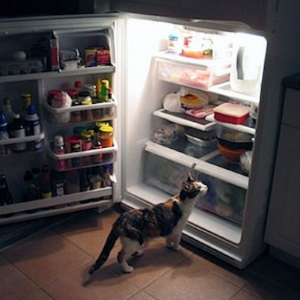We’ve all seen or heard, over decades, learned studies that claim bedtime snacking makes you fatter. Now, a coordinated examination of snacking behaviour shows late eating promotes obesity three ways.
 Late eating has profound effects on our risk of developing obesity…
Late eating has profound effects on our risk of developing obesity…
I suspect we haven’t seen studies such as this one before for one simple reason: researchers and foodies didn’t want to see one of their fave secret indulgences so cruelly indited.
Of course, it’s not just them. It’s anybody who likes a bedtime snack, or who works on a schedule contrary their body clocks’ natural rhythm. And there are a lot of the latter since folks have gotten back work following the COVID crisis.
What they did
Researchers at Brigham and Women’s Hospital (affiliated with Harvard), wanted to see how – and why – late eating affects our metabolism.
“We wanted to test the mechanisms that may explain why late eating increases obesity risk,” explained Study senior author Dr. Frank A. J. L. Scheer. “Previous research by us and others had shown that late eating is associated with increased obesity risk, increased body fat, and impaired weight loss success. We wanted to understand why.”
Scheer and his team studied 16 patients with body mass indices (BMI) in the overweight or obese range. Each participant completed two laboratory protocols: one with a strictly enforced early meal schedule. The other schedule included the exact same meals, each scheduled about four hours later in the day. In the last two to three weeks before starting each of the in-laboratory protocols, participants maintained fixed sleep and wake schedules. And in the final three days before entering the laboratory, they strictly followed identical diets and meal schedules.
What they found
Researchers took frequent small blood samples, body temperature measurements and energy consumption readings. Subjects self reported of their diet and hunger experiences.
According to an abstract of the study report: “Results revealed that eating later had profound effects on hunger and appetite-regulating hormones leptin and ghrelin, which influence our drive to eat. Specifically, levels of the hormone leptin, which signals satiety, were decreased across the 24 hours in the late eating condition compared to the early eating conditions. When participants ate later, they also burned calories at a slower rate and exhibited adipose tissue gene expression towards increased adipogenesis and decreased lipolysis, which promote fat growth. […] These findings convey converging physiological and molecular mechanisms underlying the correlation between late eating and increased obesity risk.”
In other words… Together, the three big drawbacks to late eating deliver a coordinated three-way attack on our metabolisms, enabling development of obesity and, by association, the many mega-diseases that obesity can trigger.
My take
Every new study on obesity comes out, it seems, exposes another way the condition puts our traditional ‘modern society’ dietary and behavioural eating habits contribute to the problem.
I guess that’s a good thing, but it’s exhausting. Because, when I’m tired, I seek out the comfort of familiar foods that are usually among the worst ones I could choose for my health.
And, like many folks, I tend to worry about the world’s and my own problems most when I’m trying to compose myself for sleep. That makes late-night cravings a quad-whammy for me.
So… Aside from installing time-locks on the fridge and pantry doors, I don’t see any way, ultimately, of saving myself from my own ancient, ingrained cravings…
~ Maggie J.

